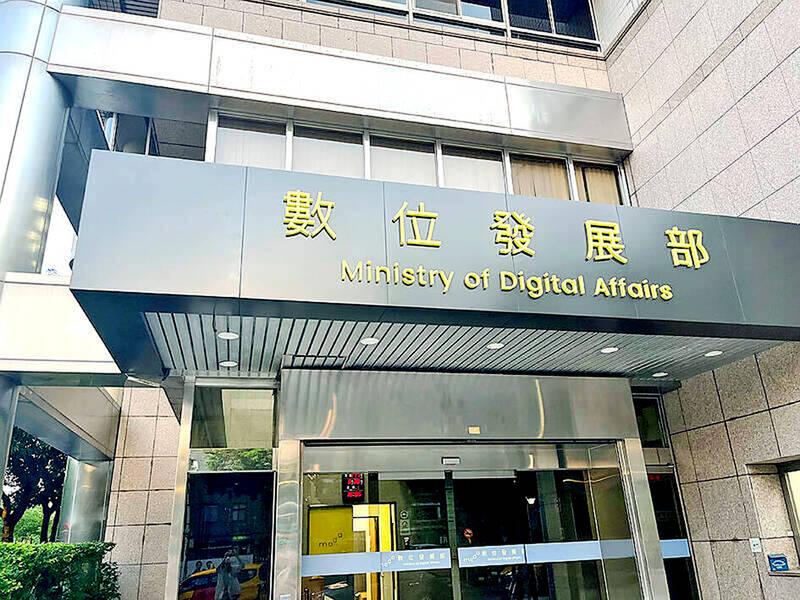The Ministry of Digital Affairs (MODA) is planning to spend NT$100 million (US$3.12 million) next year to purchase artificial intelligence (AI) graphics processing units (GPUs) and facilitate an AI computing platform.
The NT$100 million would also be used to improve cybersecurity as part of the AI computing platform, the ministry said yesterday.
The platform would be particularly important for start-ups and smaller companies, a ministry official said.

Photo: Hsu Tzu-ling, Taipei Times
The ministry has selected 64 qualified applicants since it started accepting applications to use the AI computing platform in July, more than half of which are start-ups, the official said.
The plan to buy no fewer than 70 GPUs next year would allow the qualified applicants to use them for free, the official added.
Minister of Digital Affairs Yennun Huang (黃彥男) in a recent interview said that many small and medium-sized enterprises (SMEs) faced difficulties in developing AI computing because of the huge expense and their limited capital, making government help a must, the official said.
Depending on the specification, an AI GPU can cost thousands or tens of thousands of US dollars.
If some SMEs and start-ups are allowed to use the GPUs for free as part of the ministry’s AI computing platform, they would be able to develop products on a trial basis to find commercial value, Huang said.
The AI computing platform is part of the ministry’s four-year cross-domain digital public infrastructure and digital services ascendancy program, the ministry said.
It is aimed at laying a sound foundation for the local software industry to develop AI applications for commercial use and boost Taiwan’s competitiveness in the digital sector, the ministry added.
This year, the ministry’s Administration for Digital Industries bought 32 advanced H100 central processing units from US-based AI chip designer Nvidia Corp and eight sophisticated MI300X GPUs from Advanced Micro Devices, another US-based AI GPU designer, to assist SMEs and start-ups.
The planned purchase of an additional 70 GPUs would inject new momentum into the AI computing platform, in which qualified applicants would be allowed to use these devices owned by the platform for six weeks, free of charge, the ministry said.
The 64 qualified applicants as part of the AI computing platform are expected to develop their AI applications in a wide range of fields, including philanthropy, education, healthcare, disaster prevention, manufacturing and transportation, the ministry said.
One of the successful applicants wants to develop a multi-language translation device by integrating Mandarin, Hoklo, Hakka and Southeast Asian languages such as Thai and Indonesian languages into a database, to help immigrants in Taiwan communicate more easily, the ministry said.
Another successful applicant wants to use data from more than 170,000 reports on rainfall volume, sewage capacity and flood records to build a model that can predict flooding, the ministry said.
A third applicant is hoping to strengthen enforcement of environmental protection laws by setting up an air pollution prevention model powered by AI technologies, the ministry said.

CHANGING LANDSCAPE: Many of the part-time programs for educators were no longer needed, as many teachers obtain a graduate degree before joining the workforce, experts said Taiwanese universities this year canceled 86 programs, Ministry of Education data showed, with educators attributing the closures to the nation’s low birthrate as well as shifting trends. Fifty-three of the shuttered programs were part-time postgraduate degree programs, about 62 percent of the total, the most in the past five years, the data showed. National Taiwan Normal University (NTNU) discontinued the most part-time master’s programs, at 16: chemistry, life science, earth science, physics, fine arts, music, special education, health promotion and health education, educational psychology and counseling, education, design, Chinese as a second language, library and information sciences, mechatronics engineering, history, physical education

The Chinese military has boosted its capability to fight at a high tempo using the element of surprise and new technology, the Ministry of National Defense said in the Quadrennial Defense Review (QDR) published on Monday last week. The ministry highlighted Chinese People’s Liberation Army (PLA) developments showing significant changes in Beijing’s strategy for war on Taiwan. The PLA has made significant headway in building capabilities for all-weather, multi-domain intelligence, surveillance, operational control and a joint air-sea blockade against Taiwan’s lines of communication, it said. The PLA has also improved its capabilities in direct amphibious assault operations aimed at seizing strategically important beaches,

New Taipei City prosecutors have indicted a cram school teacher in Sinjhuang District (新莊) for allegedly soliciting sexual acts from female students under the age of 18 three times in exchange for cash payments. The man, surnamed Su (蘇), committed two offenses in 2023 and one last year, the New Taipei District Prosecutors’ Office said. The office in recent days indicted Su for contraventions of the Child and Youth Sexual Exploitation Prevention Act (兒童及少年性剝削防制條例), which prohibits "engaging in sexual intercourse or lewd acts with a minor over the age of 16, but under the age of 18 in exchange for

The High Prosecutors’ Office yesterday withdrew an appeal against the acquittal of a former bank manager 22 years after his death, marking Taiwan’s first instance of prosecutors rendering posthumous justice to a wrongfully convicted defendant. Chu Ching-en (諸慶恩) — formerly a manager at the Taipei branch of BNP Paribas — was in 1999 accused by Weng Mao-chung (翁茂鍾), then-president of Chia Her Industrial Co, of forging a request for a fixed deposit of US$10 million by I-Hwa Industrial Co, a subsidiary of Chia Her, which was used as collateral. Chu was ruled not guilty in the first trial, but was found guilty